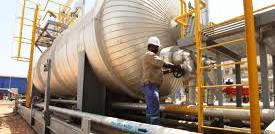The ongoing political unrest in neighbouring Sudan has greatly affected South Sudan’s oil sector, an official said.
Landlocked South Sudan exports its crude oil via pipelines across its northern neighbor to Port Sudan.
Speaking to reporters in Juba on Friday, information minister Michael Makuei Lueth said the country’s oil exports had been disrupted due to protests in Sudan.
The minister explained that the government was unable to import some oil processing chemicals due to the popular uprising in Sudan.
“But the most important thing is that the current situation in [Sudan]… the problem in Khartoum is affecting this [oil] sector because there are certain chemicals that are supposed to be imported via Port Sudan and these are the chemicals used for oil processing,” said Makuei.
Sudan’s President Omar al-Bashir was on April 11 forced to step down by the military after three decades of autocratic power.
Makuei expressed concerns over the current strike by staff of companies operating in the oil fields, saying oil has accumulated in Port Sudan.
“We have a lot of oil which should have been lifted by now, but has accumulated in Port Sudan. This is another problem we face,” he said.
South Sudan currently produces 135,000 barrels of crude oil per day.
Makuei, however, said they plan to further produce 200,000 barrels per day of oil to generate hard currencies for development.
“The minister of petroleum informed us that the oil production at the present is 135,000 bpd, but the projects are high and there is a likelihood of us going beyond 200,000 bpd,” he added.
South Sudan, where oil revenues make up nearly 98 percent of the budget, has been reeling under an economic crisis due to the five-year civil war.




